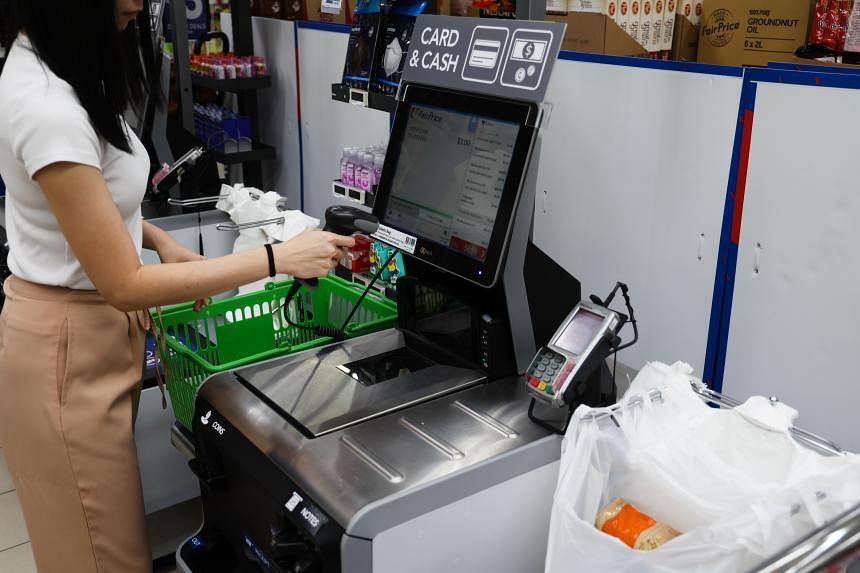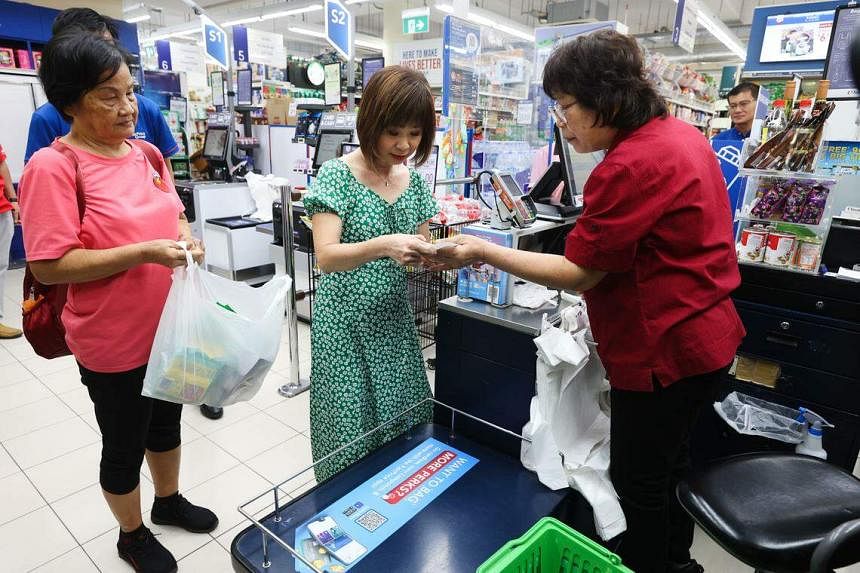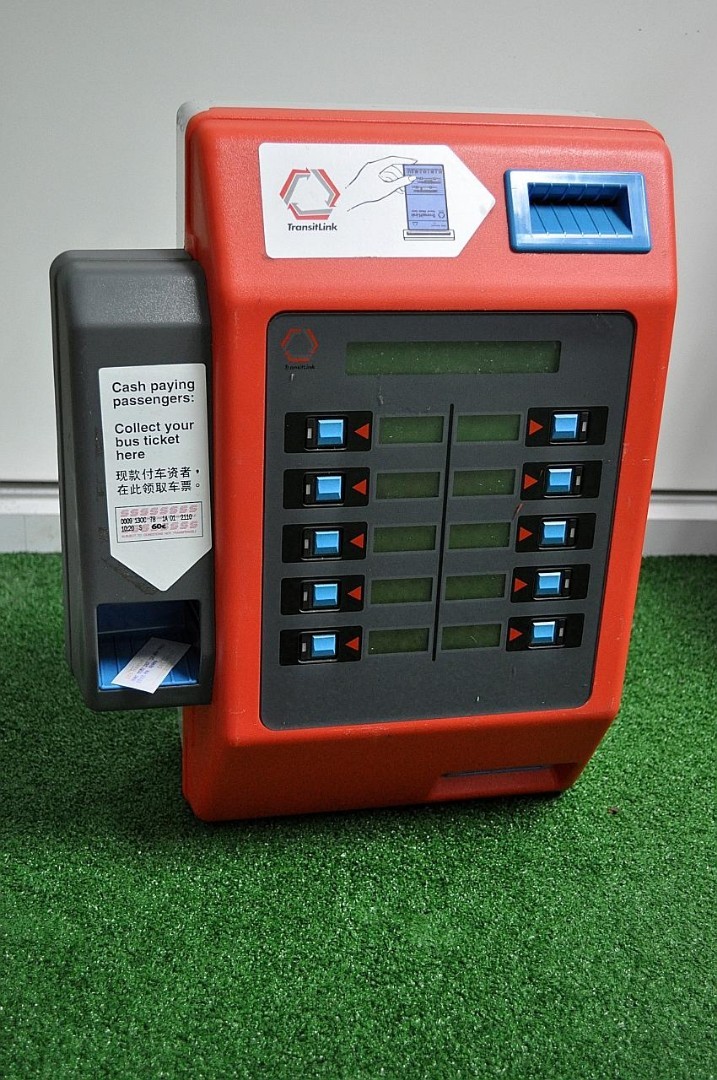Any advise from forum members? ("Advise" is incorrectly used, waiting for Sam Leong to spot and do the correction to "advice.")
How many ah peks and ah mas will be caught?
Will pilfering of plastic bags become such a big problem and cost Fairprice money that they will eventually hire Plastic Bag Ambassadors?

There are no plans to add more staff at self-checkout counters to ensure that customers scan the barcode for plastic bags. PHOTO: LIANHE ZAOBAO
Lynda Hong
JUN 19, 2023
SINGAPORE – FairPrice customers will be trusted to scan a barcode to pay five cents for every plastic bag they take at self-checkout counters from July 3, when the mandatory plastic bag charge kicks in for major supermarket chains.
There are no plans to add more staff at self-checkout counters to ensure that customers comply, said FairPrice Group chief sustainability officer Chan Tee Seng.
“For now, we want to focus on making it seamless, easy and not too bureaucratic,” he told reporters after Senior Minister of State for Sustainability and the Environment Amy Khor visited a FairPrice outlet in Bukit Batok West.
“This is why we have decided to implement an honour system. So we will allow customers to scan the barcode themselves. If they’ve taken five bags, then they scan it five times. And we believe that by and large, many of our customers will do the right thing.”
FairPrice is now focused on training front-line staff, such as cashiers, to explain the environmental reason for the plastic bag charge.
Details of how the funds collected from the five-cent charge will be used for environmental or social causes will be made known in about 18 months, said Mr Chan.
Currently, 11 FairPrice outlets charge 20 cents per transaction when plastic bags are requested at the cashier, regardless of how many bags are used. At 178 convenience stores run by FairPrice, including Cheers and FairPrice Xpress outlets, the charge per transaction is 10 cents.
The mandatory charge of five cents per bag, regardless of the size of the bag, will be applied at all the group’s supermarkets as well as convenience stores, where bags can be smaller than those at supermarkets.
FairPrice is also running a pilot at five outlets for customers to donate their excess reusable bags for other customers to use.
In the lead-up to the bag charge in July, environment organisations like Plastic-Lite Singapore and Zero Waste SG have also introduced bag-sharing initiatives at some supermarkets.
Ms Tan Huileng, executive director of Zero Waste SG, said: “The only major problem is when paper bags are donated – they are not water-resistant to hold groceries, especially frozen food.”
Otherwise, they have found that the bag racks do not need much maintenance as people generally keep the bag racks tidy.
Dr Khor reiterated hopes that the bag charge, which is similar to schemes in Hong Kong, Taiwan and Britain, will reduce plastic bag use by 60 per cent to 90 per cent.

Senior Minister of State for Sustainability and the Environment Amy Khor hopes that the bag charge would reduce plastic bag use by 60 to 90 per cent. PHOTO: LIANHE ZAOBAO
About 400 major supermarkets – or two-thirds of all outlets in Singapore – will charge for disposable shopping bags.
Under the Resource Sustainability Act, larger supermarket operators with an annual turnover of more than $100 million fall under the mandate. These include FairPrice, Cold Storage, Giant, Sheng Siong and Prime Supermarket.
Sheng Siong will implement an in-built plastic bag dispenser at self-checkout counters, said a spokesman. Customers press a button on-screen to receive a plastic bag from the dispenser.
This system has so far been implemented at five Sheng Siong outlets, and will be rolled out to more stores in phases.
The supermarket chain will also train its staff and use collaterals to educate customers about the bag charge.
DFI Retail Group – which runs Giant, Cold Storage, CS Fresh, Guardian and 7-Eleven outlets – said it is working closely with its respective partners to ensure a smooth implementation of the bag charge.
All staff will be briefed and trained on the necessary procedures.
How many ah peks and ah mas will be caught?
Will pilfering of plastic bags become such a big problem and cost Fairprice money that they will eventually hire Plastic Bag Ambassadors?
FairPrice counts on shoppers’ honesty at self-checkout counters when plastic bag charge starts on July 3
1 of 2
There are no plans to add more staff at self-checkout counters to ensure that customers scan the barcode for plastic bags. PHOTO: LIANHE ZAOBAO
Lynda Hong
JUN 19, 2023
SINGAPORE – FairPrice customers will be trusted to scan a barcode to pay five cents for every plastic bag they take at self-checkout counters from July 3, when the mandatory plastic bag charge kicks in for major supermarket chains.
There are no plans to add more staff at self-checkout counters to ensure that customers comply, said FairPrice Group chief sustainability officer Chan Tee Seng.
“For now, we want to focus on making it seamless, easy and not too bureaucratic,” he told reporters after Senior Minister of State for Sustainability and the Environment Amy Khor visited a FairPrice outlet in Bukit Batok West.
“This is why we have decided to implement an honour system. So we will allow customers to scan the barcode themselves. If they’ve taken five bags, then they scan it five times. And we believe that by and large, many of our customers will do the right thing.”
FairPrice is now focused on training front-line staff, such as cashiers, to explain the environmental reason for the plastic bag charge.
Details of how the funds collected from the five-cent charge will be used for environmental or social causes will be made known in about 18 months, said Mr Chan.
Currently, 11 FairPrice outlets charge 20 cents per transaction when plastic bags are requested at the cashier, regardless of how many bags are used. At 178 convenience stores run by FairPrice, including Cheers and FairPrice Xpress outlets, the charge per transaction is 10 cents.
The mandatory charge of five cents per bag, regardless of the size of the bag, will be applied at all the group’s supermarkets as well as convenience stores, where bags can be smaller than those at supermarkets.
FairPrice is also running a pilot at five outlets for customers to donate their excess reusable bags for other customers to use.
In the lead-up to the bag charge in July, environment organisations like Plastic-Lite Singapore and Zero Waste SG have also introduced bag-sharing initiatives at some supermarkets.
Ms Tan Huileng, executive director of Zero Waste SG, said: “The only major problem is when paper bags are donated – they are not water-resistant to hold groceries, especially frozen food.”
Otherwise, they have found that the bag racks do not need much maintenance as people generally keep the bag racks tidy.
Dr Khor reiterated hopes that the bag charge, which is similar to schemes in Hong Kong, Taiwan and Britain, will reduce plastic bag use by 60 per cent to 90 per cent.

Senior Minister of State for Sustainability and the Environment Amy Khor hopes that the bag charge would reduce plastic bag use by 60 to 90 per cent. PHOTO: LIANHE ZAOBAO
About 400 major supermarkets – or two-thirds of all outlets in Singapore – will charge for disposable shopping bags.
Under the Resource Sustainability Act, larger supermarket operators with an annual turnover of more than $100 million fall under the mandate. These include FairPrice, Cold Storage, Giant, Sheng Siong and Prime Supermarket.
Sheng Siong will implement an in-built plastic bag dispenser at self-checkout counters, said a spokesman. Customers press a button on-screen to receive a plastic bag from the dispenser.
This system has so far been implemented at five Sheng Siong outlets, and will be rolled out to more stores in phases.
The supermarket chain will also train its staff and use collaterals to educate customers about the bag charge.
DFI Retail Group – which runs Giant, Cold Storage, CS Fresh, Guardian and 7-Eleven outlets – said it is working closely with its respective partners to ensure a smooth implementation of the bag charge.
All staff will be briefed and trained on the necessary procedures.








